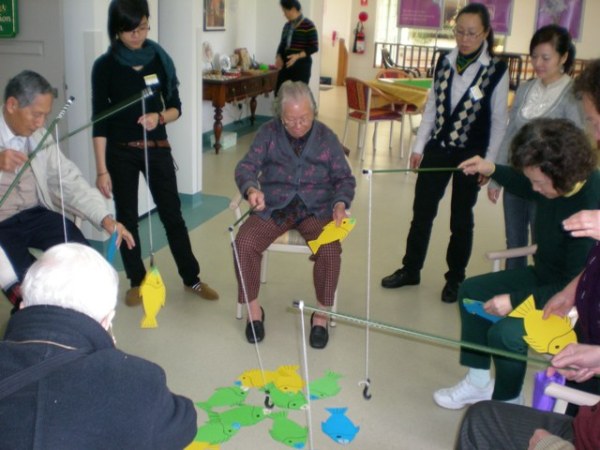So Wai Lifestyle Activity Centre
There are two key issues that aged care facilities who focus on residents with dementia must deal with:
- Providing ongoing, varied, and culturally sensitive lifestyle activities.
- Supporting relatives with the difficult decisions regarding the ongoing care of their loved ones.
The
success achieved at Bernard Chan Nursing Home highlights the benefits and
opportunities of a model that has seen the development of a community day
activity centre alongside a 45 bed high care facility.
The So Wai Lifestyle Activity Centre was built in early 2008. The dementia respite program is run four days a week and is funded by the Department of Health and Ageing under the National Respite for Carers Program - "Demonstration Day Respite Services in Residential Aged Care Facilities". The centre was designed and purpose built to provide a high quality, dementia friendly, safe and secure environment for delivering dementia respite services to elderly people. The service is based on an integrated model that provides a comprehensive range of activities to meet the social, psychological and medical needs of both the sufferers of dementia and their carers. The centre is also culturally specific to the needs of South East Asian residents in the Inner West suburbs of Sydney.
Celia Chik who is Executive Officer for Service Standards and Systems is proud of their service and stressed that the overall atmosphere created at the centre depends on the "combined impact of the physical environment, the ability to maintain high levels of activity and the dedication of staff."
Current activities include:
- Gentle exercise.
- Occupational therapy and physiotherapy - 2 hours per week average.
- Music therapy.
- Art therapy.
- Horticulture therapy.
- Aromatherapy.
- Reminiscence.
- Memory games e.g. matching games, pairing games.
- Sensory stimulation games e.g. tasting of different sauces, smelling of different herbs.
- Mental activities e.g. Mahjong, chess.
- Karaoke Singing.
- Outings to places of interest.
- Cooking of snacks and festive food.
- A focus on cultural festive occasions.
- Satellite Chinese TV programs.
- Ball games.
On average, clients of the day service are engaged in activities for up to 6 hours per day.
Whilst the day respite program has been greatly appreciated by carers living in the community it has also provided numerous flow on effects for the residents of the residential aged care facility.
As Ada Cheng, Executive Officer for Planning and Development explains:
"The residents of the aged care facility benefit greatly from the expanded facilities and the opportunity to link into the wide array of activity programs run at the dementia centre. The integration program has enabled the staff of the residential aged care facility to expand their knowledge and understanding in respect of the care of dementia sufferers. It addresses the diversity of choices for both current and future care recipients. Most importantly it has provided a transitional step between respite and permanent residential aged care. It has enabled carers to integrate with and get first hand knowledge about residential care. This goes a long way to easing the burden of guilt and anxiety associated with entrusting the care of a loved one with others".
Another positive is that clients from the dementia day care service enjoy easy access to support from nursing staff who work in the nursing home. Examples of different support services provided from the nursing home are; medication management, use of medical and supportive equipment, and hot meals.
The Carers Resource and Education Centre promote the healthy living of carers through skills and observed training. Carers have access to bilingual books, audio-visual reference resources on dementia care and behaviour management. The running of carer support groups facilitates mutual support among family carers as well as to assist them to maintain quality caring relationships for as long as possible.
Beyond providing respite care, the service provides additional health monitoring and intervention. Each client is provided with:
- A six monthly dental check up
- A 12 monthly optometrist assessment
- Continence assessments
- Dietician services on request
- Nursing care assessment and care plan development
In this area of service, positive reinforcement is critical to maintaining continual quality improvement. In this respect the service has been able to link improving levels of relative satisfaction to the impact of the new service.
0 comments